For decades, Iran has considered the United States and Israel to be among the greatest threats to the theocracy. After the 1979 revolution, the new Islamic Republic labeled the United States the “Great Satan” and Israel the “Little Satan.” Iran has engaged in a shadow war with both the United States and Israel in the Middle East dating back to the early 1980s, although many of the operations were carried out by proxy militias or allies. The revolutionary government in Tehran has long feared U.S. plots to overthrow the theocracy, diminish its influence, and eliminate its allies. The U.S. invasions of Afghanistan in 2001 and Iraq in 2003—countries on its western and eastern borders—heightened those fears. Iran views Israel as an obstacle to the creation of a Palestinian state and, as a nuclear and superior military power, a physical threat to its security.
Iran’s top concerns about the United States have included:
- U.S. forces in the Middle East
- U.S. arms and aid to adversaries, including Saudi Arabia and Israel
- Economic sanctions
- Sabotage and cyberattacks on its nuclear program
- Diplomatic pressure and condemnation of the government
- Support for opposition groups
Iran’s top concerns about Israel have included:
- Sabotage of its nuclear program, including cyberattacks and assassinations of nuclear scientists
- Attacks on its proxy militias, including Lebanon’s Hezbollah and Iraq’s Kataib Hezbollah
- Support for opposition groups
- New alliances with Arab Gulf states
- Oppression of Palestinians
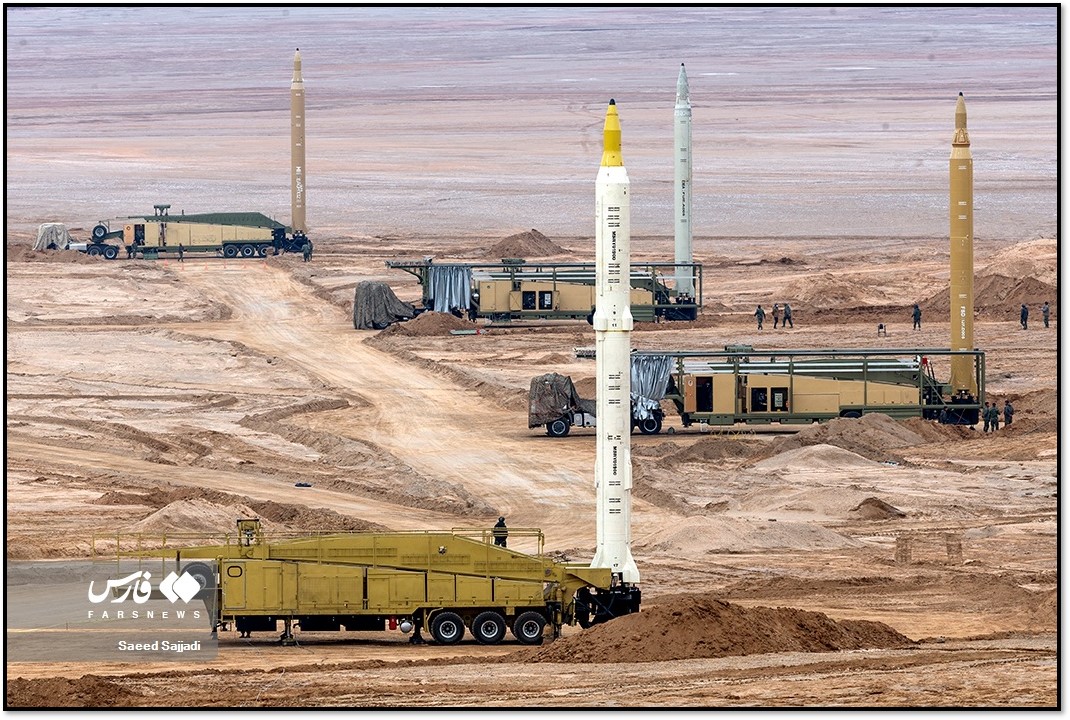
For decades, Ayatollah Ali Khamenei, Iran’s supreme leader, has vowed resistance against both the United States and Israel with inflammatory rhetoric. “The U.S. regime is the embodiment of evil, violence, creating chaos, and warmongering,” Khamenei said in 2019. Iranian officials intensified threats against U.S. officials after the U.S. assassination of General Qassem Soleimani, who ran the foreign operations of the Islamic Revolutionary Guard Corps (IRGC), in January 2020.
“The only thing that can compensate the blood of this martyr is the complete destruction of America in the region,” Brig. Gen. Amir Ali Hajizadeh, commander of the IRGC Aerospace Force, said after Soleimani’s funeral on Jan. 6, 2020. Brig. Gen. Esmail Ghaani, who took over command of the IRGC Qods Force after Soleimani’s death, warned in 2021, “We are telling the Americans you have still time to leave the region in humiliation, or you will be expelled in a manner worse than in Afghanistan.”
Senior officials have also challenged Israeli’s right to exist. In 1991, the supreme leader called Israel “a malignant cancerous tumor in the West Asian region that has to be removed and eradicated: it is possible and it will happen.” He has proposed a referendum for both Jews and Arabs to determine the future of the Holy Land.
The pace of threats accelerated after the assassinations of five nuclear scientists between 2010 and 2020, which Iran blamed on Israel. Iran also implicated it in Soleimani’s killing. The U.N. Security Council “must live up to its Charter-based responsibilities and hold the United States and the Israeli regime to account for planning, supporting and committing that terrorist act,” Iran’s U.N. ambassador wrote in an open letter marking the first anniversary of Soleimani’s death.
After Soleimani’s assassination, Iran launched 15 ballistic missiles on U.S. forces stationed at the al Asad and Erbil military bases in Iraq, injuring more than a hundred. Since 2020, Tehran has also signaled its own military preparedness in exercises on land, sea and air, including:
- Jul. 28, 2020: The IRGC fired missiles at a dummy U.S. aircraft carrier near the Strait of Hormuz during a drill involving the Aerospace Force and Navy. Commandos repelled from helicopters onto the fake ship, speedboats fired rockets at it, and scuba divers carried out mock operations against it.
- Sept. 10-12, 2020: The Ground Forces, Air Defense Forces, Air Force and Navy of the Artesh (conventional military) participated in an annual war game around three key waterways — the Strait of Hormuz, the Sea of Oman and the northern Indian Ocean. Iran tested cruise missiles, anti-air missiles and four types of drones.
- Jan. 5-7, 2021: The Artesh held a two-day drone drill in the northern province of Semnan. The drill featured hundreds of drones which undertook offensive operations including the targeting of air-to-air missiles, striking ground targets, and the deployment of “kamikaze” drones.
- Jan. 13-14, 2021: Iran’s conventional Navy conducted short-range missile drill in the Gulf of Oman over two days. The exercised included the inauguration of two new ships, the missile-carrier Zereh and the logistics warship Makran.
- Jan. 15, 2021: The IRGC launched Zolfaghar and Dezful ballistic missiles as well as bomb-carrying drones against mock enemy bases during a drill.
- May 25, 2021: The electronic warfare forces of the Artesh conducted a drill focused on electronic defense against aircraft and cyber defense.
- Oct. 1, 2021: The Ground Forces of the Artesh launched an exercise near the border with Azerbaijan. Armor, aviation, artillery, and infantry divisions participated. The drill also featured the first use of domestically manufactured long-range drones.
- Nov. 7-9, 2021: The Ground Forces, Air Defense Forces, Air Force and Navy of the Artesh participated in a war game held around four key waterways – the Strait of Hormuz, the Sea of Oman, the Red Sea and the Indian Ocean. Iran tested a wide variety of weapons, including cruise missiles, torpedoes, and suicide drones.
- Dec. 20-24, 2021: The ground, naval and aerospace units of the IRGC participated in a war game along the Persian Gulf coast. Iran tested a wide variety of weapons, including ballistic missiles, drones and tanks, during the war game. The IRGC simultaneously launched 16 ballistic missiles at a model of Israel’s Dimona nuclear facility.
- Jan. 21, 2022: Iran, China, and Russia held a joint naval drill in the northern Indian Ocean. Both Iranian Navy and IRGC Navy ships took part in the “2022 Marine Security Belt” exercise. The drill covered around 10,600 miles of sea and included artillery practice, tactical maneuvering and rescue operations. It was the third joint naval drill between the three countries.
- Sept. 7-9, 2022: The Ground Forces of the Artesh held a drill focused on combined arms operations. Units from the Army’s infantry, artillery, aviation, airborne, drone, engineer, and electronic warfare divisions participated. The Artesh also used Fath-360 short-range ballistic missile and the Fajr 5 artillery rocket for the first time.
- Oct. 17-21, 2022: IRGC Ground Forces conducted a drill in the Aras region near the border with Azerbaijan. The exercise featured combined arms operations, including the use of suicide drones, rocket artillery, and armor units.
- Oct. 23-26, 2022: The Ground Forces of the Artesh held a three-day drill in West Azerbaijan Province near the Iraqi border. Units from the Army’s 164th Mobile Assault Battalion as well as from infantry, armored, artillery, drone, engineering, airborne, and electronic warfare divisions participated.
- Oct. 27, 2022: The Artesh’s electronic warfare units held an exercise near Isfahan. It focused on offensive and defensive electronic warfare tactics.
- Dec. 30, 2022 – Jan. 2, 2023: The Ground Forces, Air Defense Forces, Air Force and Navy of the Artesh held a three-day exercise called “Zolfaghar 1401” in an area stretching from the Strait of Hormuz to the northern India Ocean. The drill included a suicide drone attack on a naval base modeled on Israel’s Eilat Naval Base.
- Jan. 17, 2023: The IRGC Navy conducted an exercise in the Persian Gulf that involved cruise missiles, bomber drones, and helicopters.
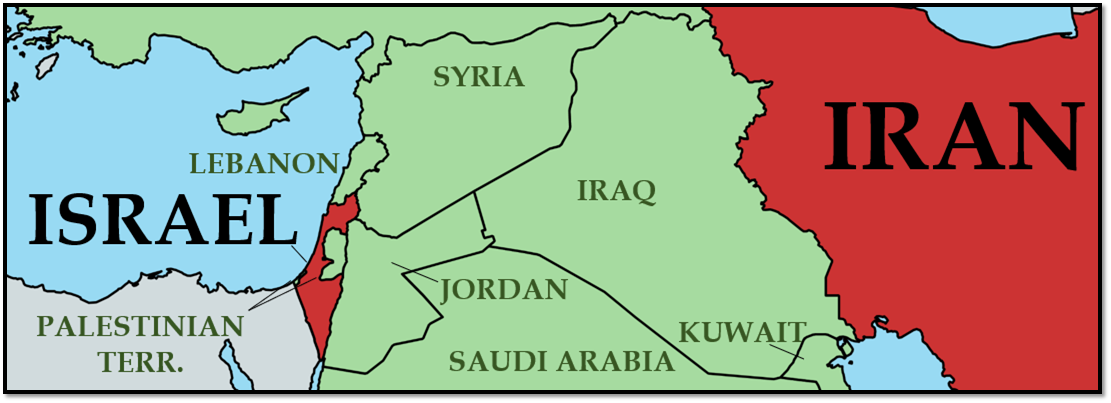 The escalating tensions since the 1979 revolution are in stark contrast to the warm ties between Iran and the United States during the monarchy. Mohammad Reza Shah Pahlavi cultivated a close relationship with President Richard Nixon and his successors – both Republican and Democrat. Iran acted as the primary guarantor of U.S. interests in the region and a bulwark against Soviet expansion. Iran used its oil wealth to buy U.S. military equipment worth billions of dollars. Relations soured after Iranian students seized the U.S. Embassy and 52 diplomats in 1979. Washington broke off relations with Tehran in 1980.
The escalating tensions since the 1979 revolution are in stark contrast to the warm ties between Iran and the United States during the monarchy. Mohammad Reza Shah Pahlavi cultivated a close relationship with President Richard Nixon and his successors – both Republican and Democrat. Iran acted as the primary guarantor of U.S. interests in the region and a bulwark against Soviet expansion. Iran used its oil wealth to buy U.S. military equipment worth billions of dollars. Relations soured after Iranian students seized the U.S. Embassy and 52 diplomats in 1979. Washington broke off relations with Tehran in 1980.
Iran also had close ties to Israel during the monarchy. Both opposed the Soviet Union and its Arab allies. Iran also sold oil to Israel. Israel had a de facto embassy in Tehran, while Iran had a secret diplomatic mission in Israel. Iran broke off relations after the ouster of the shah and turned the embassy over to the Palestinian Liberation Organization. Tensions heightened after Israel’s invasion of Lebanon in 1982, when Iran dispatched some 2,000 Revolutionary Guards to Lebanon to foster the creation of Hezbollah. The following are key remarks by Iranian officials on the United States and Israel since 2020.
On the United States:
Supreme Leader Ayatollah Ali Khamenei
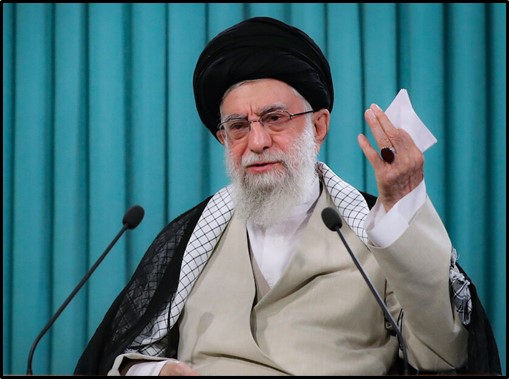
In a tweet on Jan. 5, 2020: “The loss of our dear General Soleimani is bitter. The continuing fight and ultimate victory will be more bitter for the murderers and criminals.”
President Ebrahim Raisi
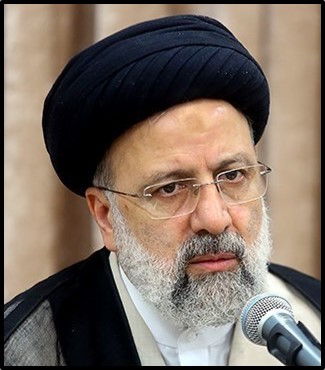
In remarks on Jul. 14, 2022: “The great nation of Iran will not accept any insecurity or crisis in the region and Washington and its allies should know that any mistake will be met by a harsh and regrettable response from Iran.”
In an address to the U.N. General Assembly on Sept. 21, 2022: “Today, hegemony and the spirit of the Cold War are scourging the world and a new era of unrest is threatening our world. … America cannot accept that countries stand on their own feet and is naïve to think that militarism is a source of security.
At a commemoration for Soleimani on Jan. 1, 2021: “They will witness a severe revenge…Do not presume that someone, as the president of America, who appeared as a murderer or ordered a murder, may be immune from justice being carried out. Never… Those who had a role in this in this assassination and crime will not be safe on Earth.”
Brig. Gen. Esmail Ghaani, Commander of the IRGC-Qods Force
Speaking at a memorial service for fallen soldiers on Dec. 2, 2021: “We are telling the Americans you have still time to leave the region in humiliation, or you will be expelled in a manner worse than in Afghanistan.”
Maj. Gen. Yahya Rahim Safavi, advisor to Supreme Leader Khamenei and former commander of the IRGC
In an interview on Iran’s channel 5 TV on Jan. 1, 2021: Iranian military forces... “conduct intelligence monitoring of all the American military movements in the Mediterranean Sea, the Red Sea, the Indian Ocean, the Sea of Oman, the Persian Gulf, and all their bases in countries around Iran... They know the Americans' weaknesses and strengths. …The Americans know that their forces in the region are very vulnerable.
Defense Minister Mohammad Reza Ashtiani
In a tweet on Oct. 2, 2021: “Enemies of the Iranian nation would definitely receive a crushing response and pay a big price in case they commit any unwise and ignorant action.”
Intelligence Minister Hojatoleslam Seyed Esmail Khatib
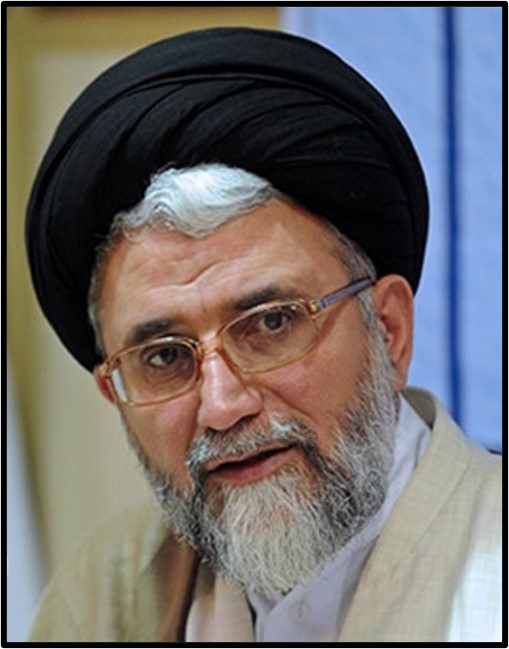
In remarks on Sept. 25, 2021: “Iraq and the Kurdistan region should not allow the mercenaries of the USA and Israel to establish training camps on our borders… Let the counter-revolutionary sides and their supporters in the region know that by trying to breach Iranian security, they will face a decisive and devastating response from the Iranian armed forces and security services.”
IRGC Commander Brig. Gen. Hossein Salami
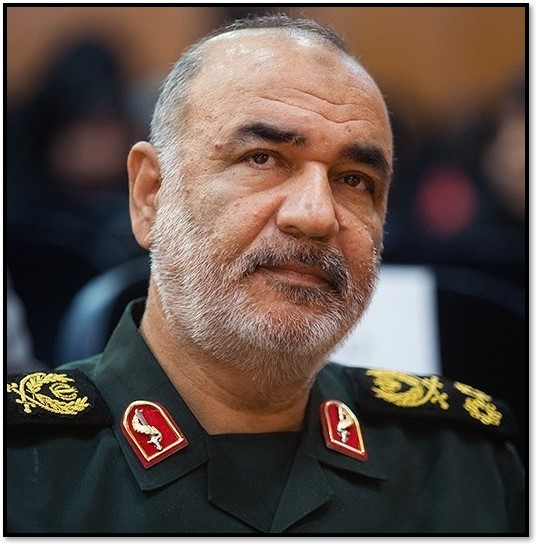
Speaking to Tasnim news on Jan. 2, 2020: “We are not leading the country to war, but we are not afraid of any war and we tell America to speak correctly with the Iranian nation. We have the power to break them several times over and are not worried.”
Speaking to Fars News Agency on Sept. 21, 2021: “We have built power to defeat the U.S. When we build power for man's largest military empire, i.e. the U.S., small powers like the Zionist regime are no longer counted in our equations.”
Commander of IRGC Aerospace Force Brig. Gen. Amir Ali Hajizadeh
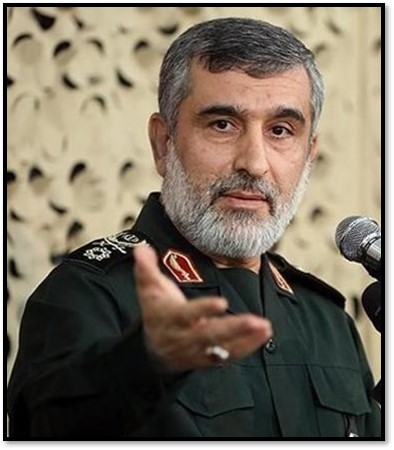
At Soleimani’s funeral on Jan. 6, 2020: “The only thing that can compensate the blood of this martyr is the complete destruction of America in the region.”
Speaker of Parliament Mohammad Bagher Ghalibaf
Remarks to lawmakers on May 31, 2020: “Our strategy in confronting the terrorist America is to finish the revenge for martyr Soleimani’s blood…(and) the total expulsion of America’s terrorist army from the region.”
On Israel:
Supreme Leader Ayatollah Ali Khamenei
In a speech on Sept. 9, 2015: “God willing, there will be no such thing as a Zionist regime in 25 years. Until then, struggling, heroic and jihadi morale will leave no moment of serenity for Zionists.”
In a speech on May 7, 2021: “Israel is not a country, but a terrorist base against the nation of Palestine and other Muslim nations… Fighting this despotic regime is fighting oppression and terrorism, and (doing so) is everyone's duty.”
President Ebrahim Raisi
In a speech during the Army Day parade in Tehran on Apr. 18, 2022: “If you make slightest move against our nation ... our armed forces destination will be the heart of the Zionist regime.”
IRGC Commander Maj. Gen. Hossein Salami
In remarks during a visit to Zahedan on Nov. 27, 2022: “We will turn this new battle scene, this huge sedition scene, and this world war into a burial ground for America, Israel and their allies… We will bury plots to target Iran, just as we've buried Israeli and American plots in the past…”
Defense Minister Amir Hatami (2017-2021)
In remarks on Mar. 8, 2021: “Zionists should know that if they commit any silly acts, Iran will turn Tel Aviv and Haifa into ashes.”
Minister of Intelligence, Hojatoleslam Seyed Esmail Khatib
Remarks to the Young Journalists Club news agency on Jun. 5, 2022: “Today, if the enemy is mobilized against us with all its resources, it will realize that it is afraid of the internal power of the Islamic system of Iran and knows that it is ready to face any threat despite the existence of all these foreign intelligence services’ agents.”
Garrett Nada, managing editor of The Iran Primer, assembled this report with assistance from Aaron Boehm, a research assistant at the U.S. Institute of Peace.
